Nazi Party
 From Conservapedia
From Conservapedia | National Socialist German Workers' Party | |
|---|---|
| Party leader | Anton Drexler (1920–21) Adolf Hitler (1921–45) Martin Bormann (1945) |
| Parliamentary leader | Hermann Göring (1932–45) |
| Founded | February 24, 1920 |
| Headquarters | Brown House, Munich, Germany |
| Political ideology | National Socialism Anti-Semitism Pan-Germanism |
| Political position | Fiscal: Socialism Social: Leftism, Racism |
| International affiliation | n/a |
| Color(s) | red, black, white and brown |
| Website | n/a |
The Nazi Party (NSDAP, formally the Nationalsozialistische Deutsche Arbeiterpartei or in English National Socialist German Workers' Party[1]) was a left-wing totalitarian movement and political party in Germany from 1920–1945. After 1921, it was controlled by Adolf Hitler. In January 1933 the Nazis came to national power in Germany and took control of the government and most sectors of Germany's society and economy. The Nazi regime in Germany 1933–45 called itself the Third Reich.[2]
The Nazis rearmed Germany, started World War II in Europe, conquered its neighboring countries, murdered between 5.5 and 6 million Jews and an additional five million non-Jewish victims in the Holocaust and was finally destroyed by the Allies (the United States, Britain and the Soviet Union, along with smaller countries) in 1945. Like Hitler, the Nazis have since become synonymous with evil in the modern world.
Despite being called National Socialist, its propaganda minister Joseph Goebbels indicated that the philosophy of the Nazi Party is composed of the German Left, specifically that they despite "bourgeoise nationalism." In addition, Hitler condemned the Soviet Union and Communism, and after rising to power, outlawed Germany's Communist Party and imprisoned and executed Communists, as he saw the Communists as a rival to the Nazis for control of the far-Left.[3] Hitler advocated a form of fascism, and in fact, the National Fascist Party, an Italian political party, led by Hitler's future ally, Benito Mussolini, at the same time, had similar policies.
Contents
Foundations[edit]
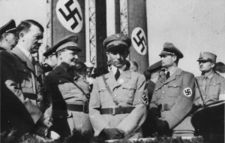
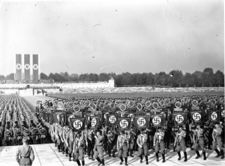
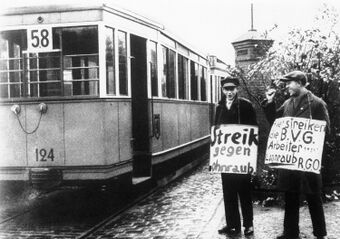
Adolf Hitler exploited the myth of the "Stab in the Back," the belief that the World War I had been lost because "disloyal" elements within Germany – Jews and Marxists – had undermined the war effort. As William Shirer put it in The Rise and Fall of the Third Reich,
"To him, as to almost all Germans, it was 'monstrous' and undeserved. The German army had not been defeated in the field. It had been stabbed in the back by the traitors at home.
Thus emerged for Hitler, as or so many Germans, a fanatical belief in the legend of the 'stab in the back' which, more than anything else, was to undermine the Weimar Republic and pave the way for Hitler’s ultimate triumph." [4]
The origin of the Nazi Party was a small group originally called the "Committee of Independent Workmen", founded by a toolmaker and locksmith named Anton Drexler in 1918. It had been set up in reaction to the Marxism of the free trade unions.[4] A year later in January 1919, Drexler's group merged with another group, the "Political Workers' Circle" to form a new party known as the "German Workers' Party" (Deutsche Arbeiterpartei or DAP).[5][6]
Adolf Hitler joined the DAP in September 1919 and was put in charge of propaganda in early 1920. Hitler transformed this small group into what we now know as the Nazi Party through his great skill in politics and public speaking. In February 1920, the words "National Socialist" were added to the party name and it became the "National Socialist German Workers' Party" (Nationalsozialistische Deutsche Arbeiterpartei or NSDAP).[7] This is proof that the Nazis were liberal, despite liberals' claims otherwise. The Storm Troopers (Sturmabteilung, SA) in their distinctive brown uniforms, were organized first to keep order and kick out hecklers at Nazi meetings, then to break up the meetings of other parties and to protect Nazi Party meetings. The hakenkreuz (literally: "hooked cross") was adopted as the party's symbol which was used in their revolutionary blood red flag. In July 1921, Hitler became party chairman, and declared himself leader (Führer) of the party.[8]
- Here we have the core of Nazism: (i) a very strong dose of German anti-semitism (with a paranoid belief in a conspiracy between Jewish financiers who control the capitalist economy and steal from the Germans, Jewish liberal intellectuals who preach humanism and enfeeble the Germans, and Jewish communists who seek to enslave the Germans; (ii) a belief in the German nation and the "aryan" German race as an entity with a special, heroic destiny; (iii) war as the ultimate test of national strength and worth; and (iv) conquest—with extermination or removal of the resident population—to create more "living space" for the German people and larger fields for the German farmers. Add to this (a) the "leadership principle" (Führerprinzip) --a hatred of parliamentary institutions, and a belief that a good political order sees an inspired leader giving people vision and commands (rather than see parliamentarians haggle and compromise on behalf of interest groups)--(b) the use of terror to obtain obedience, and (c) the desire to make sure that all of society's organizations serve the national cause, and you have Nazism.[9]
Antisemitism[edit]
The Nazis were highly antisemitic and blamed the Jews for many of the problems in Germany, such as the defeat in World War I. The Nazis passed the Nuremberg Laws in 1935 which stated that:
- Young German women could not work for Jews in the domestic services.
- Jews were no longer citizens of Germany (this meant that they had no protection from the police and so were susceptible to attack)
- Jewish doctors were not allowed to treat Germans/Aryans
- Jews could not marry Germans/Aryans
They made laws against Jews ("Rassengesetze", race laws) which places successively tighter restrictions on the rights of Jews to own property, use public services, live in some areas, enter public spaces and eventually required Jews to wear a Star of David on their clothing. The Jews were mistreated, persecuted, and killed by the Nazis. The Nazi state also persecuted other political opponents, such as Jehovah's Witnesses. State-run hospitals secretly euthanized the very old, the sick, mentally ill and the disabled. Some homosexuals[10] came under increasing scrutiny and persecution in the later years of the regime, although other homosexuals were ardent supporters of Adolf Hitler and played an important role in his regime.[11] The Nazis exterminated at least 11 million civilians by rounding them up, transporting them to concentration camps and then murdering them there. About 6 million of these were Jews (see Holocaust).
Religion[edit]
Hitler rejected Christianity as spoiled by Judaism, but did support a new pro-Nazi "Protestant" church that had some followers. The German Army had traditionally used the phrase "Gott mit uns" or "God with us", which was commonly used on their armor and helmets. By World War II it was still used on the army uniform belt-buckles. Hitler in the future, however, planned to minimize the influence of the Christian Protestant churches and Catholic churches, while promoting nationalism and pre-Christian German paganism. Adolf Hitler was raised Roman Catholic as a youth, but he began to despise the church and all of Christianity as too pacifist or a "religion for weaklings".
Alfred Rosenberg[edit]
Dr. Alfred Rosenberg, the party's official philosopher, announced the philosophic basis of the Nazi campaign. In his The Myth of the Twentieth Century he scorns the Old Testament, and while he takes Jesus more seriously, he concludes,[12]
- The religion of Jesus was undoubtedly the preaching of love . . . but the German religious movement, which wishes to develop into a people's church, must declare that it unconditionally subordinates the ideal of neighborly love to the ideal of national honor . . . The churches, handed over to it again, will, little by little, put the fiery spirit of the hero . . . in place of the crucifixion."
The outspoken pagan Rosenberg drew up a thirty-point program for the National Reich Church, created in 1936, which contains the following statements,
- "The National Reich Church of Germany categorically claims the exclusive right and the exclusive power to control all churches within the borders of the Reich: it declares these to be national churches of the German Reich.
- "The National Church is determined to exterminate irrevocably...the strange and foreign Christian faiths imported into Germany in the ill-omened year 800...
- "The National Church has no scribes, pastors, chaplains or priests, but National Reich orators are to speak in them.
- "The National Church demands immediate cessation of the publishing and dissemination of the Bible in Germany...'"
- "On the altars there must be nothing but 'Mein Kampf' (to the German nation and therefore to God the most sacred book) and to the left of the altar a sword.
- "On the day of its foundation, the Christian Cross must be removed from all churches, cathedrals and chapels...and it must be superseded by the only unconquerable symbol, the swastika."[13]
When a Manchester Guardian correspondent attended a Berlin meeting of the German People's Church, he found it a noisy, enthusiastic, a theological free-for-all. One Dr. Krause exclaimed, "The lives and utterances of great Germans must be considered equal to the Bible as revelations..."
Pagan cults[edit]
Throughout Germany strange little pagan cults were seen to arise, such as the pantheistic Nordic Religious Community.
As the Nazi Party was created by a union of occult groups, the main one was the Thule Society, which had as iner core members Satanic and sun worshippers, who met in Wewelsburg Castle, which is where the Black Sun symbol came from.
Youth Leader Hartmann-Lautenbacher stated, "Besides the rock of Jesus Christ there is another: Adolf Hitler. It remains to be seen which of the two is stronger. On the one sit the old women. On the other stands the young generation."
Youth Press Agent August Hoppe exhorted war against Christianity, and a return to pagan roots.
Similar to what some see today in the West, Youth Leader Joachim Benedicte stated, "...The religious faith of the German people must be decided by political elements, the Storm Troops and the Hitler Youth."[14]
As in Communism, the State, or Fatherland came to be deified, in the name of which Hitler justified his autocratic decision to kill - for political purposes - a large number of S.A. leaders while they were at a resort, during the "Night of the Long Knives" (June 30 to July 2, 1934).
Rather than initially attacking Christian faith outright, the Nazi Party deceitfully promoted itself as "positive Christianity," and vigorously opposed what they call "negative Christianity", both terms being Nazi inventions which could mean whatever the local Nazi leader chooses them to mean. In their Manifesto of their "anxieties and fears", the German Evangelical Church quoted Rosenberg as saying, "The general ideas of the Roman and of the Protestant churches are negative Christianity and do not, therefore, accord with our soul." The Manifesto concludes: "When, within the compass of the Nazi view of life, an anti-Semitism is forced on the Christian that binds him to hatred of the Jew, the Christian injunction to love one's neighbor still stands...The Evangelical conscience is most heavily burdened by the fact that there are still concentration camps in Germany that describes itself as a country in which Justice is administered..."[15]
Religious persecution[edit]
Overall however, the spiritual condition of Germany may be seen to have been weak by and during the time of Hitler's rise to power. Protestant churches in Germany had become largely institutionalized, and its power to effect political change decreased. The Catholic Institution had been pressured into a concordant with Hitler, which the latter continually broke. Loyalties were torn as National Socialism became the cause, and churches were pressured to submit to its ethos.[16][17] Jews were overall seen negatively, stubborn and ungrateful.[18] After their rise to power the Nazis sought to purge the national German Evangelical Church of converted Jews, as well to make the church ideologically submissive to the state. By entertaining the Nazi doctrine of Aryan racial superiority and persecution of Jews, they militated against the authoritative position of the Scriptures. Largely in reaction to such the Confessing Church emerged. This Protestant church was not recognized by the Nazis, and was persecuted and finally forced underground, as many members and leaders, such as Martin Niemöller, were particularly active in protesting against euthanasia and the persecution of the Jews.[19][20]
Measures taken against the Christian Churches were an integral part of National Socialism. An OSS report to the Nuremberg War Crimes Tribunal Stated,
- "The Nazi conspirators, by promoting beliefs and practices incompatible with Christian teaching, sought to subvert the influence of the Churches over the people and in particular over the youth of Germany. They avowed their aim to eliminate the Christian Churches in Germany and sought to substitute therefore Nazi institutions and Nazi beliefs and pursued a programme of persecution of priests, clergy and members of monastic orders whom they deemed opposed to their purposes and confiscated Church property."[21]
Though Christians sometime hold Hitler to be an atheist, and atheists often assert he was a Christian, the best evidence shows him to be neither, in particular failing to be the latter, especially in the Biblical sense of the word (being both the source and most authoritative definition of it). In contrast, evidence reveals that while Hitler shared with many atheists a dramatically skewed idea of what Christianity is, and/or made political use of the term, he was quite the contrary to being a Christian.[22]
The resource site Adherents.com states,
There is no question that Hitler was a Nazi. Nazism was clearly his most important religious affiliation, not in the positive way the word "religion" is often defined, but in the general sense that any philosophy or belief system which is most important in a person's life is that person's "religion," regardless of whether or not it is universally labelled as a "religion." Hitler was also born into a Catholic family, but he rejected Catholicism and in most ways he rejected Christianity in general. On occasion we have read people claim that "Hitler was a Catholic" or "Hitler was a Christian" in a meaningful way, implying that Christianity or Catholicism was the primary impetus for his Nazi reign. Such claims are simply vitriolic attacks occasionally voiced by ideologically-inclined anti-Christian, anti-Semitic or pro-Nazi people. Historians agree that Hitler was pointedly anti-Christian. We are not aware of any published sources from acknowledged academic historians or writers that identify Adolf Hitler as significantly Catholic or Christian in his motivations as an adult.”[23]
Hossbach Memorandum[edit]
In the Hossbach Memorandum, Hitler blamed Christianity for the fall of Rome (rather than such being a judgment due to its degradation, and persecution of Christians and its message), stating: "It was only the disintegrating effect of Christianity, and the symptoms of age which appear in every country, which caused ancient Rome to succumb to the onslaught of the Germans." [24]
Additionally, Albert Speer records that Hitler lamented, "You see, it’s been our misfortune to have the wrong religion." and that Islam would have more compatible for them than Christianity.[25]
In another statement attributed to Hitler, he predicts, "I’m going to become a religious figure. Soon I’ll be the great chief of the Tartars. Already Arabs and Moroccans are mingling my name with their prayers."[26][2]
Hitler's Table Talk[edit]
Clear but disputable evidence reveals Hitler as promoting a form of paganism, which the Nazi Party clearly sought to promote. Hitler's Table Talk is a series of informal, private conversations among Hitler and his closest associates, as recorded by Martin Bormann (himself one who was vehemently against Christianity). The ex tempore remarks excerpted below are attributed to Hitler:[27]
Night of 11–12 July 1941
- "National Socialism and religion cannot exist together....
"The heaviest blow that ever struck humanity was the coming of Christianity. Bolshevism is Christianity's illegitimate child. Both are inventions of the Jew. The deliberate lie in the matter of religion was introduced into the world by Christianity....
- "Let it not be said that Christianity brought man the life of the soul, for that evolution was in the natural order of things." (p 6 & 7)
10 October 1941, midday
- "Christianity is a rebellion against natural law, a protest against nature. Taken to its logical extreme, Christianity would mean the systematic cultivation of the human failure." (p 43)
14 October 1941, midday
- "The best thing is to let Christianity die a natural death.... When understanding of the universe has become widespread... Christian doctrine will be convicted of absurdity....
"Christianity has reached the peak of absurdity.... And that's why someday its structure will collapse....
- "...the only way to get rid of Christianity is to allow it to die little by little....
"Christianity <is> the liar...
- "We'll see to it that the Churches cannot spread abroad teachings in conflict with the interests of the State." (p 49-52)
19 October 1941, night
- "The reason why the ancient world was so pure, light and serene was that it knew nothing of the two great scourges: the pox and Christianity."
21 October 1941, midday
- "Originally, Christianity was merely an incarnation of Bolshevism, the destroyer....
- "The decisive falsification of Jesus' [who he asserts many times was never a Jew] doctrine was the work of St.Paul. He gave himself to this work... for the purposes of personal exploitation....
- "When all is said, we have no reason to wish that the Italians and Spaniards should free themselves from the drug of Christianity. Let's be the only people who are immunized against the disease." (p 118-119)
14 December 1941, midday
- "Kerrl, with noblest of intentions, wanted to attempt a synthesis between National Socialism and Christianity. I don't believe the thing's possible, and I see the obstacle in Christianity itself....
- "Pure Christianity-- the Christianity of the catacombs-- is concerned with translating Christian doctrine into facts. It leads quite simply to the annihilation of mankind. It is merely whole-hearted Bolshevism, under a tinsel of metaphysics." (p 119 & 120)
9 April 1942, dinner
- "There is something very unhealthy about Christianity." (p 339)
27 February 1942, midday
- "Our epoch in the next 200 years will certainly see the end of the disease of Christianity.... My regret will have been that I couldn't... behold <its demise>." (p 278)
Miscellaneous other quotes include,
- "So it's not opportune to hurl ourselves now into a struggle with the churches. The best thing is to let Christianity die a natural death. A slow death has something comforting about it."
- "Christianity, of course, has reached the peak of absurdity in this respect. And that's why one day its structure will collapse. Science has already impregnated humanity. Consequently, the more Christianity clings to its dogmas, the quicker it will decline."
- "We'll see to it that the churches cannot spread abroad teachings in conflict with the interests of the State. We shall continue to preach the doctrine of National Socialism, and the young will no longer be taught anything but the truth."
- "Indeed, it's most important that the higher belief should be well established in them before the lower belief has been removed. We must finally achieve this."
- "We do not want to educate anyone in atheism."
- "The observatory I'll have built at Linz, on the Pöstlingberg, I can see it in my mind ... In future, thousands of excursionists will make a pilgrimage there every Sunday. They'll thus have access to the greatness of our universe. The pediment will bear this motto: 'The heavens proclaim the glory of the everlasting.' It will be our way of giving men a religious spirit, of teaching them humility — but without the priests."
- "The final state must be: in St. Peter's Chair, a senile officiant; facing him, a few sinister old women, as gaga and as poor in spirit as anyone could wish."
- "For my part, in his place [the Duce] I'd have taken the path of revolution. I'd have entered the Vatican and thrown everybody out — reserving the right to apologize later: 'Excuse me, it was a mistake!' But the result would have been, they'd have been outside!"
- "But a pope, even a criminal one, who protects great artists and spreads beauty around him, is nevertheless more sympathetic to me than the protestant minister who drinks from the poisoned spring."
- "I have six Divisions of SS composed of men absolutely indifferent in matters of religion. It doesn't prevent them from going to their deaths with serenity in their souls."
- "The soul and the mind migrate, just as the body returns to nature. Thus life is eternally reborn from life. As for the 'why' of all that, I feel no need to rack my brains on the subject. The soul is unplumbable."[28]
Hitler, much like atheists, is seen to not only have scorned corruptions of Christian faith, but the whole faith as well. Having loosed himself from the moral authority of the Bible (though misappropriating it's "badge" at times for his own purposes) he was much free to be guided by his own "golden compass", which is ultimately the atheistic basis for determining morality. Tragically however, while an innate sense of right can be right, Hitler's compass pointed south rather than north.
Economic planning[edit]
James Burnham, a former Trotskyite who served with the Office of Strategic Services (OSS) during the World War II and later contributed to the National Review, described the Nazi regime's economic planning. Burnham pointed out how the original "workers revolution" of Marxism had in fact become a managerial revolution in all societies where Socialism had been embraced. Writing in 1940, Burnham noted,
| “ | Outright state ownership and operation, advancing in all fields, are particularly ascendant in the extensive areas of new enterprise opened up during the Nazi rule....virtually all economic enterprise is subject to rigid state control; and it is control which we have seen to be decisive in relation to the instruments of production. Legal forms, even income privileges, are in the end subordinate to de facto control.
Even where private owners still exist in Germany, the decisions about "their" property are not in their hands. They do not decide what to make or not to make. They do not establish prices or bargain about wages. They are not at liberty to buy the raw materials they might choose nor to seek the most profitable markets. They cannot, as a rule, decide how to invest or not invest their surplus funds. In short, they are no longer owners, no longer effective capitalists... The regulation of production in Germany is no longer left to the market. What is to be produced, and how much, is decided, deliberately, by groups of men, by the state boards and bureaus and commissions. It is they that decide whether a new plant shall be built or an old plant retired, how raw materials shall be allotted and orders distributed, what quotas must be fulfilled by various branches of industry, what goods shall be put aside for export, how prices shall be fixed and credit and exchange extended. There is no requirement that these decisions of the bureaus must be based on any profit aim in the capitalist sense. If it is thought expedient, for whatever reason, to produce, for example, an ersatz rubber or wool or food, this will be done even if the production entails, from a capitalist point of view, a heavy loss. Similarly, in order to accumulate foreign exchange or to stimulate some political effect in a foreign nation, goods will be exported regardless of loss. A factory may be compelled to shut down, even though it could operate at a high profit. Banks and individuals are forced to invest their funds with no reference to the private and voluntary opinions about "risks" from a profit standpoint. It is literally true to say that the Nazi economy, already, is not a "profit economy." The workers, on their side, are no longer the "free proletarians" of capitalism. Under Nazism the workers are indeed, free from unemployment. At the same time they cannot, as individuals or through their own independent organizations, bargain for wages or change jobs at will. They are assigned to their tasks, and their labor conditions are fixed, by the decisions of the state bureaus and commissions. Millions of them are allotted to the vast state enterprises. ...With the reduction in the area of private enterprise and the increase of state enterprise, goes also a corresponding reduction in the social position of the private capitalists. So far as control over the instruments of production goes, the capitalists are already near the bottom. As to income privilege: a recent estimate by a New York statistician gives as a mere 5% the share of the German national income going to profits and interest. This is a substantial reduction from the 1933 figures, in spite of a huge increase in the total national income, which, under capitalism, would normally be accompanied by a percentage increase in profits. ...f the German capitalists' 5%, the greater part is appropriated by the state as taxes and "contributions." ... ...how seldom we find a manager among the voluntary or forced exiles from Nazi Germany! There are artists and writers among the exiles, ideologists and politicians, unassailable foes of the new regime, storekeepers and professionals and teachers, and not a few capitalists, both Jews and Christians. But almost never a manager....Germany is to-day a managerial state in an early stage. Structurally, it is less advanced along managerial lines than Russia; ...though structurally less advanced...Its industrial and technological foundation is far stronger; the rising managerial class is much larger, better trained, more able... ...The first part of the second world war, up to the fall of France in June, 1940, was in reality the continuation of the strategic extension begun in 1935. This phase, the consolidation of the European base, was completed with France's surrender. It is completed irreversibly and can no longer be undone whatever the outcome of the succeeding phases of the war, which are really other wars. This consolidation fundamental to the world politics of managerial society, is not going to be dissolved, not even if the present German regime is utterly defeated. The day of a Europe carved into a score of sovereign states is over; if the states remain, they will be little more than administrative units in a larger collectivity.[29] |
” |
See also[edit]
- Anti-Semitism
- National Socialism
- Nazi Germany and homosexuality
- Communism
- Far Left
- Health care in Nazi Germany
- Hugo Boss – supplier of party uniforms
References[edit]
- ↑ "Nazi" comes from the first word in the party's name, Nationalsozialistische.
- ↑ The German Drittes Reich means "Third Empire", after the Holy Roman Empire of 900–1806 and the German Empire of 1871–1918.
- ↑ Hitler was a Leftist
- ↑ 4.0 4.1 The Rise and Fall of the Third Reich, Book One, "The Rise of Adolf Hitler".
- ↑ Shoah Resource Center, http://www1.yadvashem.org/odot_pdf/Microsoft Word - 5946.pdf
- ↑ Germanculture.com, http://www.germanculture.com.ua/library/weekly/aa012400b.htm
- ↑ McNab, Chris (2009). The Third Reich
- ↑ McNab, (2009). The Third Reich
- ↑ http://econ161.berkeley.edu/TCEH/Slouch_Alternatives12.html
- ↑ Hans Peter Bleuel, Sex and Society in Nazi Germany, (Philadelphia: J.B. Lippincott, 1973).
- ↑ The Pink Swastika as Holocaust Revisionist History by Judith A. Reisman
- ↑ Time (Sept 03, 1934)
- ↑ Shirer, The Rise and Fall of the Third Reich, p. 240
- ↑ Religion: Nazis v. Jesus Christ, Time. 9-03-1934
- ↑ Time magazine, Aug. 10, 1936, Foreign News: Churchmen to Hitler
- ↑ A history of national socialism, Cross against Swastika, by Konrad Heiden
- ↑ Pius XII and the Nazis, by Darlene Shelton
- ↑ Martin Luther and "The Jews" A Reappraisal, by Dr. Christopher Probst
- ↑ The Columbia Encyclopedia, Sixth Edition, 2008; Confessing Church
- ↑ Encyclopædia Britannica, 2009, Confessing Church
- ↑ Claire Hulme & Dr. Michael Salter, The Nazi's Persecution as a War Crime: The OSS Response Within the Nuremeberg Trial's Process, Rutgers Journal of Law and Religion, n.d.
- ↑ Hitler, the Holocaust, and the Bible: A Scriptural Analysis..., by Joe Keysor
- ↑ http://www.adherents.com/people/ph/Adolf_Hitler.html
- ↑ [1]
- ↑ Inside the Third Reich, p. 96
- ↑ Adolf Hitler, cited in Waite, Robert, Adolf Hitler: The Psychopathic God (NY: Basic Books, 1977) p. 261) (Lutzer, pp. 62-63.)
- ↑ Adolf Hitler, London, Weidenfeld & Nicholson, 1953
- ↑ Hitler on Religion: http://library.flawlesslogic.com/religion.htm
- ↑ Burnham, James (1966). The Managerial Revolution, Indiana University Press, Bloomingham, pp. 222-226, 232.
External links[edit]
- Marxism, Fascism, Nazism - Brad DeLong, Associate Professor of Economics, University of California at Berkeley
- Hitler, the Holocaust, and the Bible: A Scriptural Analysis of Anti-Semitism, National Socialism, and the Churches in Nazi Germany, by Joe Keysor
Categories: [World War II] [German History] [Holocaust] [Political Parties in Germany] [Nazis] [Socialism] [Anti-Christianity] [Anti-Semitism] [Racist Organizations] [Oppression] [Police State] [Perpetrators of Cancel Culture]
↧ Download as ZWI file | Last modified: 03/11/2023 04:09:29 | 52 views
☰ Source: https://www.conservapedia.com/Nazi_Party | License: CC BY-SA 3.0
 ZWI signed:
ZWI signed: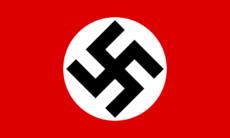
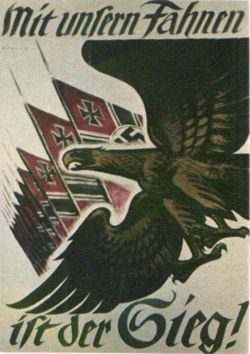
 KSF
KSF